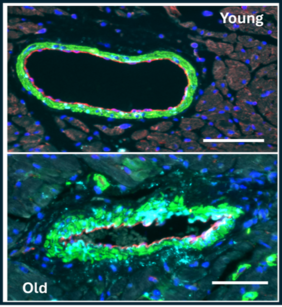Jena/Coimbra. An international research team has identified the protein Lactadherin as a marker for heart aging. Furthermore, it is now confirmed that Lactadherin is also involved in crucial signaling pathways and inflammatory processes associated with aging, particularly cardiovascular diseases. The study was published at the end of January 2024 in "Molecular & Cellular Proteomics." Alessandro Ori (PhD) co-led the study, and his research group "Aging of Protein Complexes" is associated with the Leibniz Institute on Aging Research – Fritz Lipmann Institute (FLI) in Jena. The project was performed in collaboration with the team of Prof. Lino Ferreira from the University of Coimbra (Portugal) and was supported by European Union’s Horizon 2020 research and innovation programme under grant agreement nº 952266 (acronym of the project: RESETAgeing).
The focus of the research was on changes in the heart muscle tissue of mice and humans. The scientists examined both the normal aging process and accelerated aging due to diseases. They discovered that specific parts of the heart tissue, especially the extracellular matrix (ECM), undergo changes during the normal aging process. The ECM is a kind of "framework" in the tissue that supports cells. Changes in the extracellular matrix (ECM) are considered a characteristic feature of many chronically inflammatory diseases that can lead to cellular dysfunction, aging, and disease progression. However, little secure knowledge existed about the ECM of the aging heart and its effects on heart cells during chronological and pathological aging.
PhD Ori's team documented that changes in this framework simultaneously affect the quantity of proteins in this area. Specifically, the protein Lactadherin was identified as a marker. It was produced in increased amounts in both normal and accelerated aging in mice and humans. Lactadherin is primarily known from milk, where it acts as an antiviral protein. However, Lactadherin also facilitates processes such as the fertilization of eggs and modulates the growth of blood vessels.
The researchers led by PhD Ori found that elevated levels of Lactadherin in the heart vessels are associated with the activation of specific "aging" signaling pathways and a pro-inflammatory response in cells. PhD Ori stated, "This could suggest that Lactadherin can not only serve as a marker for heart aging but is also involved in crucial signaling pathways and inflammatory processes associated with the aging process and cardiovascular diseases." Identifying Lactadherin as a potential biomarker could help in better assessing the risk of cardiovascular diseases in the future. Furthermore, based on the research results, new approaches for treating age-related heart problems could be developed.
Publication
Santinha D, Vilaça A, Estronca L, Schüler SC, Bartoli C, De Sandre-Giovannoli A, Figueiredo A, Quaas M, Pompe T, Ori A, Ferreira L.
Remodelling of the cardiac extracellular matrix proteome during chronological and pathological ageing.
Mol Cell Proteomics 2023 Dec 21 epub ahead of print.










